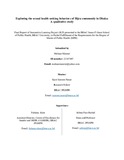Exploring the sexual health seeking behaviors of hijra community in Dhaka: a qualitative study
Abstract
Introduction
Hijra people in Bangladesh are stigmatized in various aspects of their lives including the
healthcare system. This study aimed to explore the sexual health service seeking behavior of
Hijra people in Dhaka city, along with its influencing factors.
Method
This study followed a qualitative approach to explore sexual health seeking behavior of Hijra
people in Dhaka. Using snow-ball sampling technique, in-depth interviews were conducted with
26 Hijra people. To achieve an overview on the sexual health seeking behavior of the Hijra
community, key informant interviews were conducted with 4 Hijra community leaders and 1
program personnel of a Hijra based NGO. The interviews were conducted in Bangla, translated
verbatim in English and coded by using both inductive and deductive approaches. Selected
interview responses were clustered and arranged according to themes and sub-themes in a data
matrix for interpretation.
Findings
The criminalization of sex-reassignment surgeries in Bangladesh compels the Hijra people to take
unmonitored risky surgeries from unqualified doctors in Bangladesh. The information on these
illegal surgeons are kept secret by the Hijra people. Despite having knowledge on safe sex
practices, many Hijra people were not consistently following these measures due to reasons like
their personal preferences, and unwillingness of customers of Hijra sex workers to wear
condoms. For sexual health services like supply of condoms, testing and treatment of STIs, most
preferred facility by Hijra people is NGO based health facilities, followed by government
hospitals. The negative experience they face in government hospitals often divert them to seek
services from informal health service providers like local pharmacies and homeopathic doctors.
Conclusion
Legalization of sex-reassignment surgeries for Hijra people, establishing designated health
facilities for them and sensitizing health service providers on Hijra people will improve sexual
health status of Hijra people in Bangladesh.

